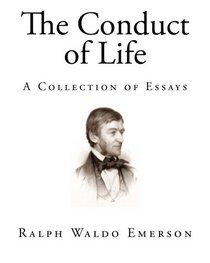Search -
The Conduct of Life: A Collection of Essays (Ralph Waldo Emerson - Political Philosophy)
The Conduct of Life A Collection of Essays - Ralph Waldo Emerson - Political Philosophy
Author:
The Conduct of Life is a collection of essays by Ralph Waldo Emerson published in 1860 and revised in 1876. In this volume, Emerson sets out to answer ?the question of the times:? ?How shall I live?? It is composed of nine essays, each preceded by a poem. These nine essays are largely based on lectures Emerson held throughout the country, includ... more »
Author:
The Conduct of Life is a collection of essays by Ralph Waldo Emerson published in 1860 and revised in 1876. In this volume, Emerson sets out to answer ?the question of the times:? ?How shall I live?? It is composed of nine essays, each preceded by a poem. These nine essays are largely based on lectures Emerson held throughout the country, includ... more »
ISBN-13: 9781512259674
ISBN-10: 1512259675
Publication Date: 5/18/2015
Pages: 130
Rating: ?
ISBN-10: 1512259675
Publication Date: 5/18/2015
Pages: 130
Rating: ?
0 stars, based on 0 rating
Publisher: CreateSpace Independent Publishing Platform
Book Type: Paperback
Members Wishing: 1
Reviews: Amazon | Write a Review
Book Type: Paperback
Members Wishing: 1
Reviews: Amazon | Write a Review
Genres:
- Literature & Fiction >> Classics
- Literature & Fiction >> Ancient & Medieval Literature >> Ancient & Classical
- Nonfiction >> Philosophy >> Ethics & Morality
- Nonfiction >> Politics >> Freedom & Security >> Political Freedom




